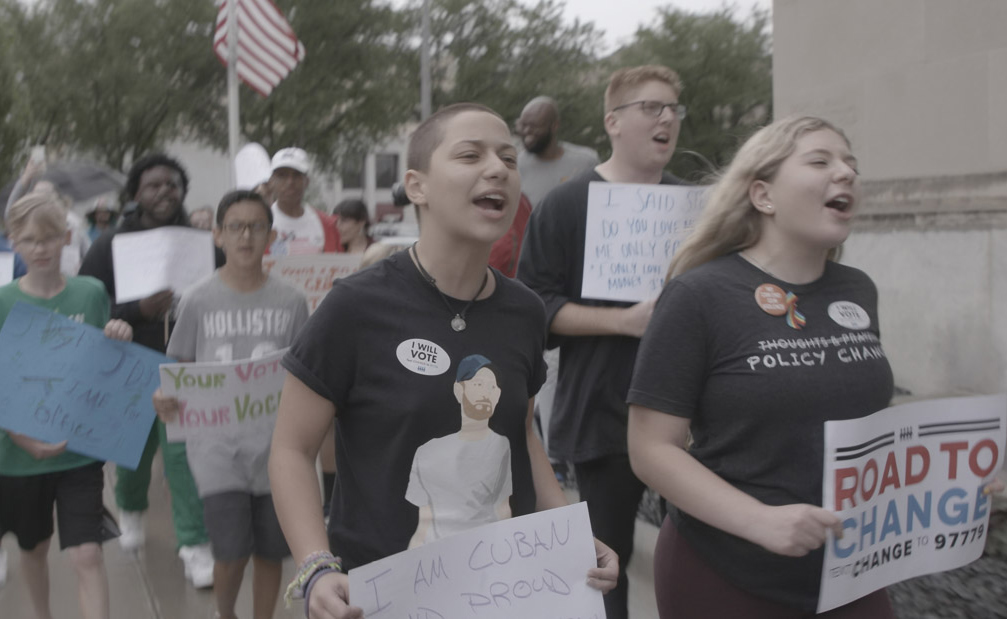One of the strongest moments in “Us Kids” happens when Samantha Fuentes can be seen speaking at the March for Our Lives rally in Washington DC organized not long after she was wounded and her classmate and friend Nick Dworet was killed in a mass shooting at Marjory Stoneman Douglas High in Parkland, Florida. While Fuentes bellows a big, gregarious “Hello” to the crowd of thousands in front of her, she speaks from the distance of time in voiceover about how frightened she was, not of public speaking, but of being shot, reminded by meeting Paul McCartney who performed that day of what happened to John Lennon, and then subsequently John F. Kennedy. The duality of the experience – of being thrust into the public spotlight and expected to say all the right things while only at the start of coming to terms with the tragedy – is well-conveyed and a constant thread throughout director Kim A. Snyder’s follow-up to “Newtown,” which is nakedly aimed as a work of activism to keep the discussion of gun violence alive more than a work of art, but finds definite points of crossover.
It’s unlikely anyone else was better suited to put the story of the Marjory Stoneman Douglas survivors into context than Snyder, who admirably didn’t stop tracking school shootings after her previous film and as a result, undoubtedly had her camera ready when the shooting at the Florida high school happened, a necessity when, rather than spend any time mourning, the students quickly channeled their grief and anger into the national movement March for Our Lives, taking on the gun lobby in Washington. For better or worse, “Us Kids” is likely to speak most strongly to those in the same age range, spending little time on the particulars of how the students were able to set up such a large-scale operation in a such a short amount of time beyond their energy and social media savvy, but consistently galvanizing in observing the likes of Emma Gonzalez and David Hogg discovering how much power they have in speaking up and inspiring others to do the same. The film matches their enthusiasm with montages scored to pop songs and the seeming mandate that no shot last more than five seconds, though in following the March for Our Lives movement from stop to stop across the country in advance of the 2018 midterms, there’s a lot to pack in and the film ably conveys the occasionally overwhelming sensory overload that the activists likely experienced.
While Snyder interviews all of the teen activists, and notably keeps adults offscreen, she is wise to stick with Fuentea as the central character of “Us Kids,” no less passionate than Gonzalez and Hogg for change, but far more ambivalent about her role in achieving it and what impact she can have. Despite the survivors-turned-activists having incredible success at seizing the moment when the world was watching them, a film is a more challenging proposition when it will serve as a definitive record of their experience when you gather they haven’t been able to process it even close to fully for themselves, yet in Fuentes, Snyder is able to get at something left unspoken but just as powerful as the students raising their voices in protest by illustrating how these teens shouldn’t have to be confronted with navigating a very adult world in the wake of these tragedies beyond the trauma associated with these horrific acts. As Fuentes is squired to events such as the Pen America Awards, accepting trophies that she likely hasn’t felt she’s earned for simply being alive and consumed with grief for those who died, the cognitive dissonance becomes clear and “Us Kids” becomes a damning indictment of a country that needs to grow up.
“Us Kids” will screen at the Sundance Film Festival in Park City on January 27th at 3:30 pm at the Redstone Cinema 1, January 29th at noon at the Sundance Mountain Resort Screening Room, January 31st at the MARC Theatre and February 1st at 12:30 pm at the Ray Theatre.




